Both ASO and keyword promotion require a thorough understanding of the app’s target audience, competition analysis, and relevant market trends. Blindly applying general or irrelevant methods without analyzing the app’s unique requirements can lead to wasted resources and missed opportunities. In keyword promotion, blindly bidding on keywords without a proper analysis of their performance can quickly drain a marketing budget. An optimal keyword promotion strategy involves monitoring the effectiveness of chosen keywords, tracking conversion rates, and making data-driven decisions to adjust bidding strategies and optimize campaigns for better results.
In the ever-evolving landscape of mobile app marketing, keyword promotion stands tall as a critical pillar of success. As developers and marketers strive to make their apps visible and enticing to potential users, keyword promotion plays a pivotal role in driving discoverability and organic downloads. However, navigating the intricate world of mobile app keyword promotion is no easy feat. Countless companies have learned the hard way that the path to success can be riddled with costly mistakes, some of which have the potential to set budgets back by an alarming $50,000 or more.
- Ineffective Keyword Selection and Ignoring of Keyword Metrics: The Foundation of Failure
- Overspending on Boosting: A Costly Bid for Supremacy
- Enhance App Discoverability: Avoid Rushing for Instant Rankings
- Improve App Reputation: AppStore Takes Ratings Seriously
- Balancing Keyword Promotion and User Engagement: A Path to Long-Term App Success
In this article, we delve into the common missteps made by our clients that have left them reeling from financial setbacks and missed opportunities in organic traffic attraction. By shedding light on these pitfalls, we aim to equip you with the knowledge and insights necessary to steer clear of such financial burdens and forge a successful path forward.
Ineffective Keyword Selection and Ignoring of Keyword Metrics: The Foundation of Failure
Just like building a house on an unstable foundation can lead to disaster, the same principle applies to keyword promotion in mobile app marketing. One of the most critical mistakes that can cost a whopping $50,000 or more is ineffective keyword selection. This step involves identifying and choosing the right keywords that align with your app’s purpose and appeal to your target audience. However, finding the perfect balance is not an easy task.
If you pick keywords that are too generic, they may not accurately represent your app, leading to poor visibility and lower downloads. On the other hand, selecting irrelevant keywords means you won’t reach your desired audience, and your marketing efforts will be wasted. Moreover, if you opt for excessively competitive keywords, your advertising budget may quickly vanish, as bidding for these high-demand keywords can be expensive and yield poor returns.
To avoid this costly mistake, meticulous keyword research is essential. This process entails understanding the search behavior of your potential users and analyzing which keywords are already working well for your competitors. By striking the right balance between relevance, specificity, and competition, you can allocate your marketing resources wisely and increase your chances of achieving a positive return on investment (ROI).
Failing to pay adequate attention to keyword selection is like setting sail without a map, leaving you to navigate aimlessly and potentially lose significant amounts of money. Therefore, investing time and effort into finding the right keywords that truly resonate with your app’s purpose and cater to your target audience is a critical step in your mobile app marketing journey. It sets the foundation for success and ensures that your marketing dollars are efficiently utilized to drive app visibility, downloads, and overall growth.
In the realm of mobile app marketing, while selecting the right keywords is crucial, it is equally essential to remember the significance of keyword metrics analysis. Keyword metrics provide valuable insights into the performance and effectiveness of chosen keywords, enabling developers and marketers to make informed decisions and fine-tune their strategies for optimal results.
Two primary keyword metrics that demand close scrutiny are the “keyword score” and “traffic.” Understanding these metrics empowers app owners to gauge the potential of each keyword and its impact on their app’s visibility and user acquisition.
Keyword Score: The keyword score, also known as keyword difficulty, reflects the level of competition associated with a specific keyword. This metric indicates how challenging it is for an app to rank higher in search results using that particular keyword. A higher keyword score implies intense competition, as numerous apps are vying for visibility using the same keyword.
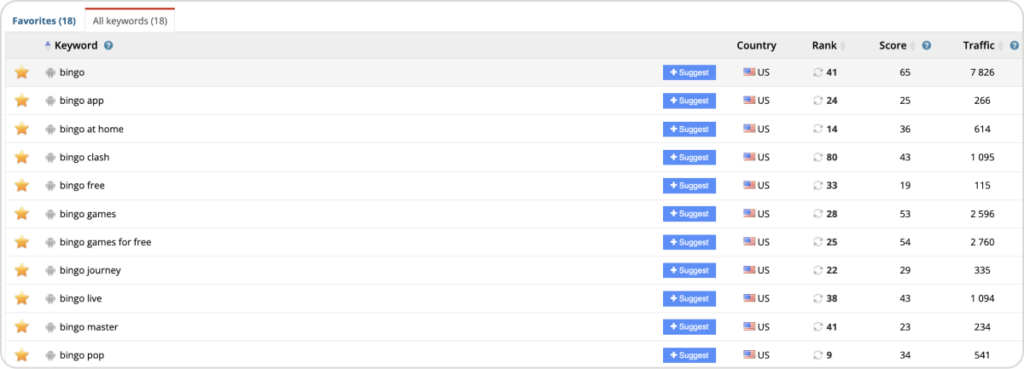
Traffic: Keyword traffic measures the popularity and frequency of users’ searches for a particular keyword. A keyword with high traffic indicates that it is frequently searched, presenting an opportunity to attract a substantial number of potential users to the app.
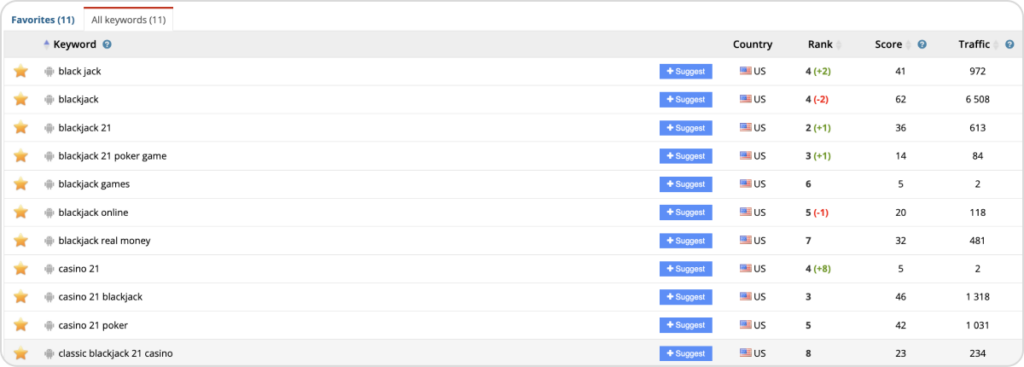
Ready to dive deeper into app keyword metrics? Check out our next article, where you can read what metrics are important for app keywords?
Neglecting both keyword selection and keyword metric analysis can lead to significant losses. Simply spending funds on promoting keywords without considering their potential to drive traffic to your app is a risky and ineffective approach. Ensuring the right keywords are chosen and analyzing their performance is crucial to achieving successful app promotion and maximizing your return on investment (ROI).
Overspending on Boosting: A Costly Bid for Supremacy
This section will mainly focus on Apple since Google’s keyword promotion has minimal consequences. Apple’s algorithm is stricter, requiring app developers and marketers to exercise greater caution in how they promote their apps using keyword installs.
While it may appear that the app store is not directly linked to rank changes and the methods used to achieve them, the reality is different. Apple closely monitors rank changes and the number of downloads an app receives for specific search queries. If they detect a sudden increase in downloads for a particular keyword, they might question the legitimacy of the app’s popularity and suspect that it obtained those downloads artificially.
Do you remember the app marketing strategy we recommended for both stores earlier? The key principle is to conduct keyword promotion in a manner that doesn’t draw undue attention from the store. It’s essential to proceed smoothly and naturally, avoiding any sudden and massive boosts in installs that might raise suspicion.
The number of downloads we set per keyword is heavily influenced by the app’s rank. Can you imagine that the app at rank 200 by keyword receives 100 installs daily for the same keyword? Of course, we know that Apple increases the ranks really fast after adding the keyword installs and that tempts them to add high volumes at once and occupy the top position already the next day. But this strategy will lead to the loss of indexation for this keyword in 70% of cases, as Apple doesn’t accept the fact that an application gets 100 keyword installs from the 200th place, as well as we do. This is a typical example of the rank behavior after high volumes are used while organic/paid traffic is low
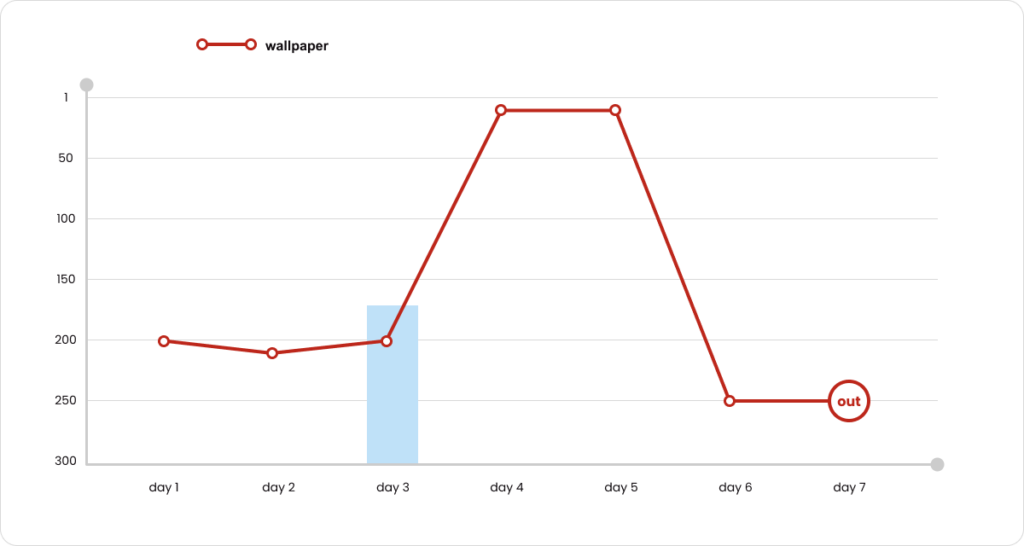
The problem in this case is not in the keyword promotion itself but in the way the installs are used, as we clearly understand that the correlation between organic and keyword targeted traffic should be saved. That’s why if your application is new and doesn’t have a lot of organic/paid installs, it is better to start the promotion with keywords that do not require thousands of downloads to get an increase, as well as use realistic volumes depending on the current rank. And now, can you imagine how much the unnatural strategy will cost if the rank for traffic keywords is lost?
Enhance App Discoverability: Avoid Rushing for Instant Rankings
Moving our focus from the App Store to Google Play, it’s essential to recognize the divergent algorithms at play on these two primary platforms. The strategies for keyword promotion diverge significantly due to these differing algorithms. Unlike the App Store, where we may witness relatively swift outcomes, Google Play operates in a distinct manner.
One noteworthy distinction is the response to what might be termed “aggressive promotion,” the practice of injecting a substantial volume of installs within a single day with the aim of rapidly boosting the app’s ranking. In the case of the App Store, such a strategy can yield discernible results; however, Google Play demonstrates a different behavior.
The algorithm governing Google Play appears less responsive to this sort of accelerated promotion. Injecting a surge of installs within a short time frame doesn’t consistently translate to an immediate rank escalation on Google Play. The platform seems to take a more measured and gradual approach, often requiring sustained efforts over time to influence rankings.
In essence, the dynamics at play in Google Play emphasize the need for patience and a longer-term perspective when engaging in keyword promotion. While the allure of rapid rank improvement may be enticing, understanding the distinct algorithmic response of Google Play underscores the importance of adopting strategies that align with its unique dynamics. By adopting a measured and sustained approach, app developers and marketers can harness the platform’s potential more effectively and optimize their efforts for lasting success.
Let’s examine two instances to illustrate our point. In the initial screenshot, we observe a common approach to promotion on Google Play. This method involves gradually increasing the daily downloads per keyword over an extended period. This particular strategy was meticulously formulated by our team after extensive testing and experimentation. Remarkably, even after numerous trials, it remains the most effective approach for Google Play promotion in terms of ranks achieved. This strategy supposes the usage of low volumes at low positions and increases in download numbers with each day of the campaign to show Google that the app gets more and more popular for this search request.
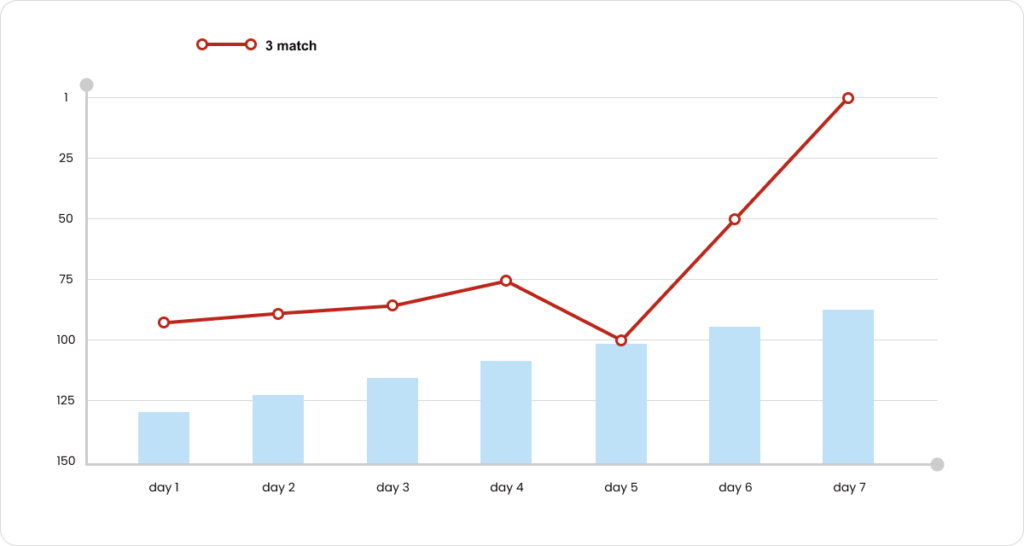
Now, let’s look at another example. This time, we’re discussing a strategy that we don’t recommend using on Google Play. It’s not a good idea because it won’t work and can end up costing you a lot of money. You see, we can’t change how Google’s algorithm reacts to keyword promotion.
In this case, the promotion was done in just one day, with 500 installs every day. Even though a lot of effort was put in and a significant budget was spent, the app’s ranking didn’t improve at all. The app’s position in the rankings stayed low. This means that the strategy used didn’t make the app more popular, even though it cost much more than the previous strategy.
This example highlights the fact that promoting your app effectively on Google Play takes time and careful planning. Quick solutions like the one used here usually don’t work well because Google’s system is more complex. It’s important to approach app promotion on Google Play with a patient and thoughtful strategy to avoid spending money without getting the results you want.
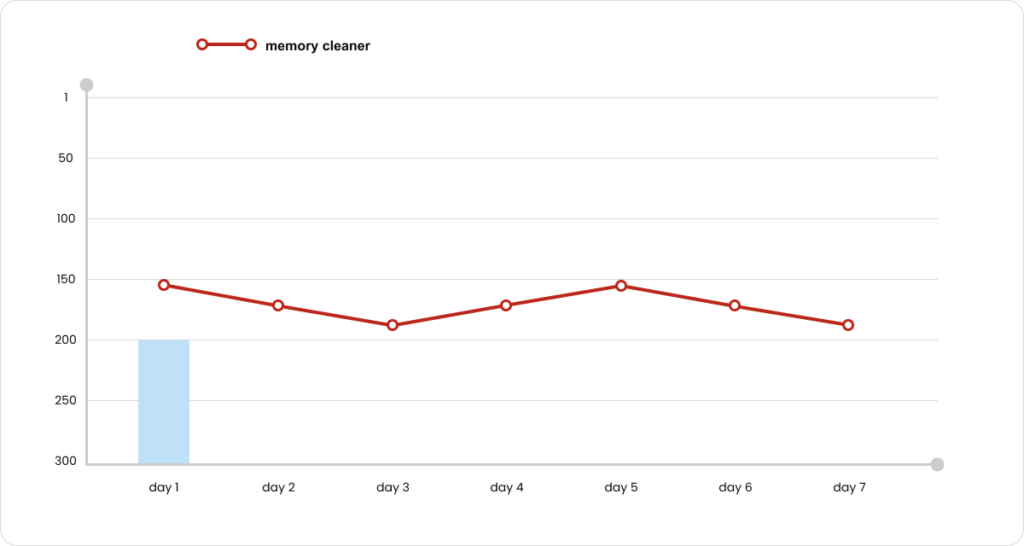
So, we realize that attempting to quickly improve rankings on Google Play won’t lead to any positive outcomes.
Improve App Reputation: AppStore Takes Ratings Seriously
We understand how crucial it is for an app to have a solid reputation. Imagine this: when people hear positive things about an app, they’re more likely to give it a try. A good reputation can really boost an app’s success and help it stand out in a crowded market.
App developers and marketers are always on the lookout for ways to make their apps more appealing to users. Nowadays, there’s an option to purchase more stars and reviews for an app. Some services allow you to buy ratings and reviews instead of just waiting for users to leave them naturally. This can lead to a quick increase in the app’s rating, but it’s important to be careful and make it look like a natural growth. For example, if your app usually gets around 50 ratings a day, suddenly getting 500 new ratings in one day might seem odd and could draw unwanted attention.
Now, when it comes to Google Play, ratings don’t have a huge impact – they might just remove ratings that seem suspicious. But on the App Store, it’s a different story. If the store notices a sudden surge in ratings, they might become suspicious of your app’s popularity. It’s a bit similar to how they handle keywords. The only difference is that ratings don’t decrease like rankings do. However, Apple might send you a warning if they detect anything unusual with the ratings or reviews you’ve acquired. To avoid this, it’s a good idea to stick to a guideline: start by purchasing a small number of ratings, maybe 20-30% of your usual daily amount.

If you do receive a warning from Apple, it’s not a huge problem as long as you stop purchasing too many ratings. But if you continue, your app could get into trouble. Let’s say Apple sends a warning when your daily ratings suddenly jump from 20 to 200; that’s a sign that something might be off. So, the best approach is to be cautious and avoid any actions that might catch the app store’s attention and negatively impact your app’s standing. We haven’t tested what may happen if we continue ordering ratings, and we do not even want to find out!
Balancing Keyword Promotion and User Engagement: A Path to Long-Term App Success
Certainly, a critical oversight in app keyword promotion, which could potentially result in a substantial cost of $50,000 or more, is underestimating the importance of user engagement and retention following the acquisition of keyword installs. This strategic error revolves around a narrow focus on driving initial app downloads through keyword promotion, often at the expense of neglecting the imperative of ensuring user satisfaction and sustained interaction.
While keyword installs can undoubtedly propel an app’s visibility and potentially increase downloads in the short term, the true success of an app lies not only in its acquisition numbers but also in its ability to keep users engaged and satisfied over the long haul. Failing to prioritize user experience can lead to a cascade of negative consequences, ultimately diminishing the effectiveness of the keyword promotion investment.
For a tangible example, consider an app that successfully secures a significant influx of installs through keyword promotion. Let’s say this effort results in a 100% increase in daily downloads over a short period of time. However, once users engage with the app, they encounter slow loading times, frequent crashes, and a lack of intuitive features. As a result, the app’s user retention rate remains low, with only 10% of new users continuing to use the app beyond the first week.
In this scenario, while the keyword promotion initially led to a doubling of downloads, the lack of emphasis on user experience has resulted in a poor retention rate. As a consequence, the app’s overall performance metrics suffer. The high uninstall rate and negative user reviews not only erode the app’s reputation but also lead to a waste of the resources invested in keyword promotion.
To circumvent this costly mistake, a comprehensive approach is imperative. App developers and marketers should seamlessly integrate keyword promotion with a commitment to cultivating an exceptional user experience. This involves continuous monitoring of user engagement metrics, such as daily active users (DAU), retention rates, and user feedback scores. For instance, an app that manages to maintain a 40% DAU-to-MAU (Monthly Active Users) ratio as a result of a well-rounded user experience strategy may outperform an app that experiences a rapid surge in downloads but fails to maintain user engagement.
In essence, keyword promotion should serve as a stepping stone toward a larger goal: creating an app that not only attracts users through keyword optimization but also retains them through a compelling user experience. By understanding the interconnectedness of keyword promotion and user engagement, app developers can ensure a more sustainable return on their investment, leading to enhanced visibility, organic growth, and long-term success.
SUM UP
Navigating the world of mobile marketing and keyword promotion can be tricky, and it’s okay if things don’t always go as planned. Sometimes, the things we try might not work out, and that’s normal. But here’s the thing: some of these mistakes can end up costing you a bunch of money, either right away or later on when you’re already in the middle of promoting your app. So, it’s important to be aware of these potential pitfalls and be careful with your decisions along the way.
If you have doubts or questions, contact our managers. We will assist you with app promotion and create a strategy which helps to get more organic downloads.






















